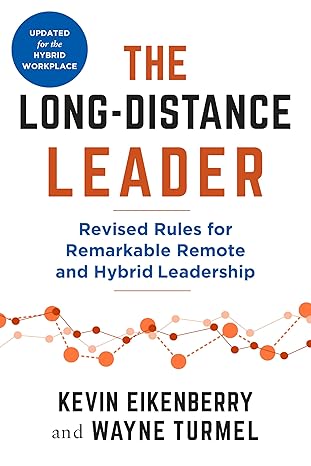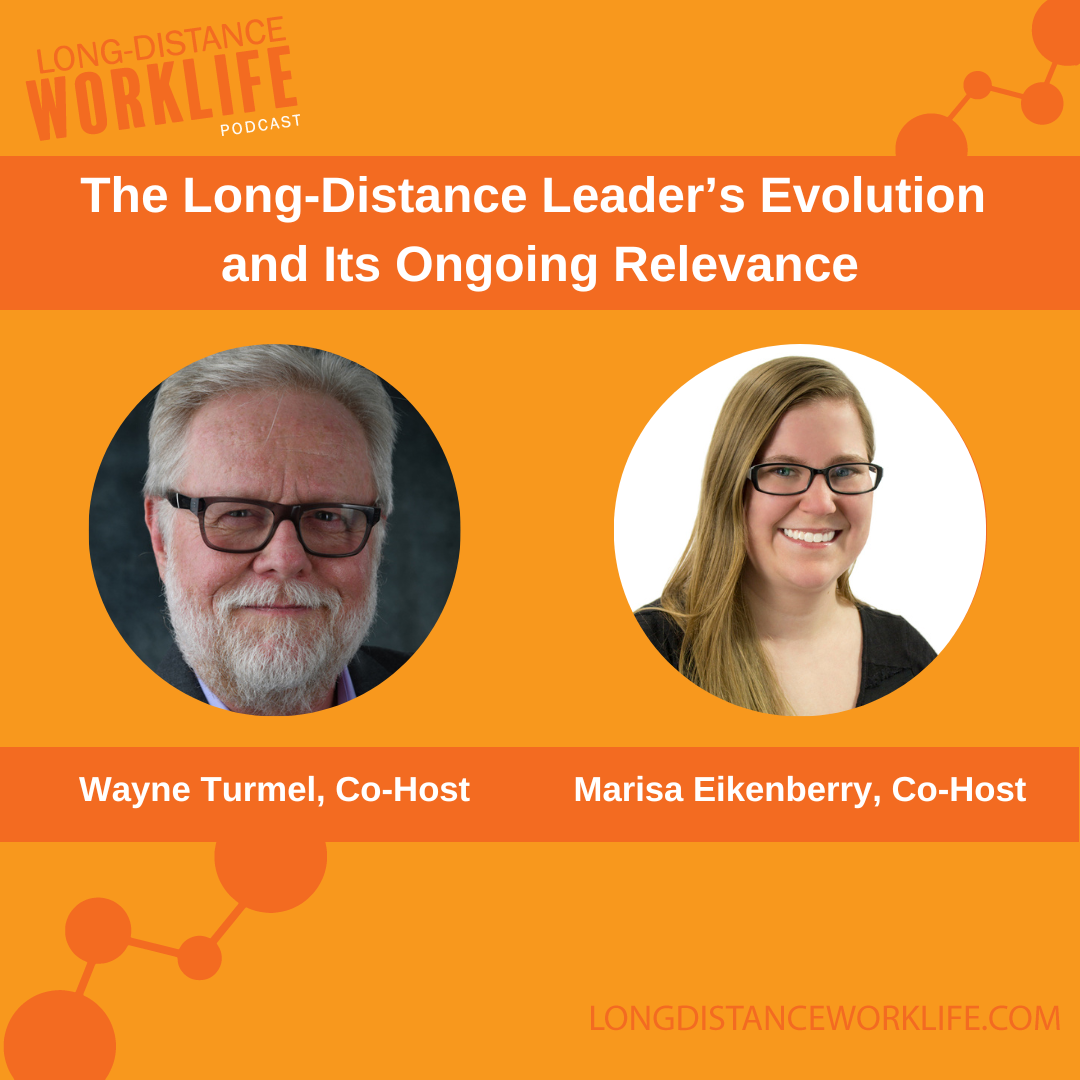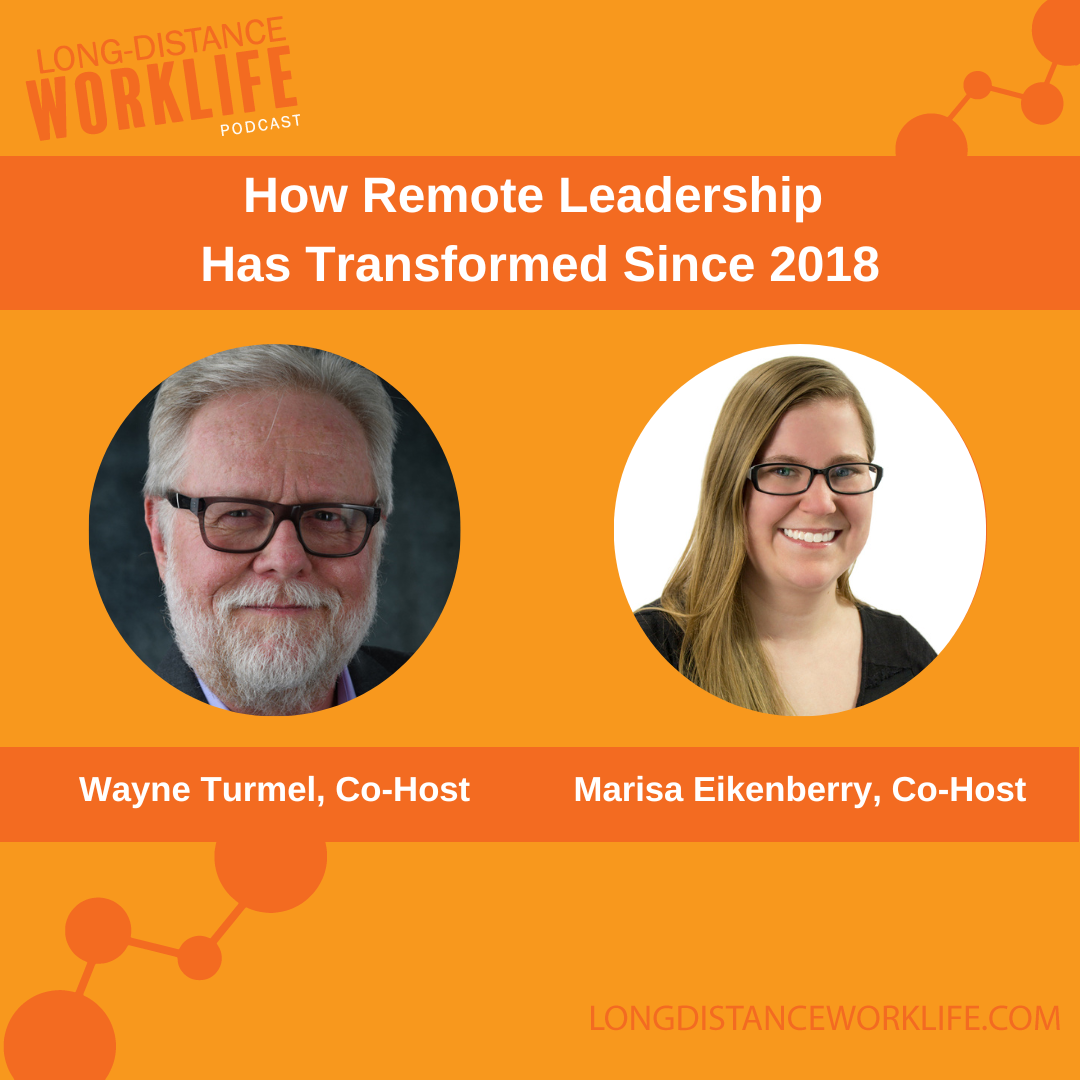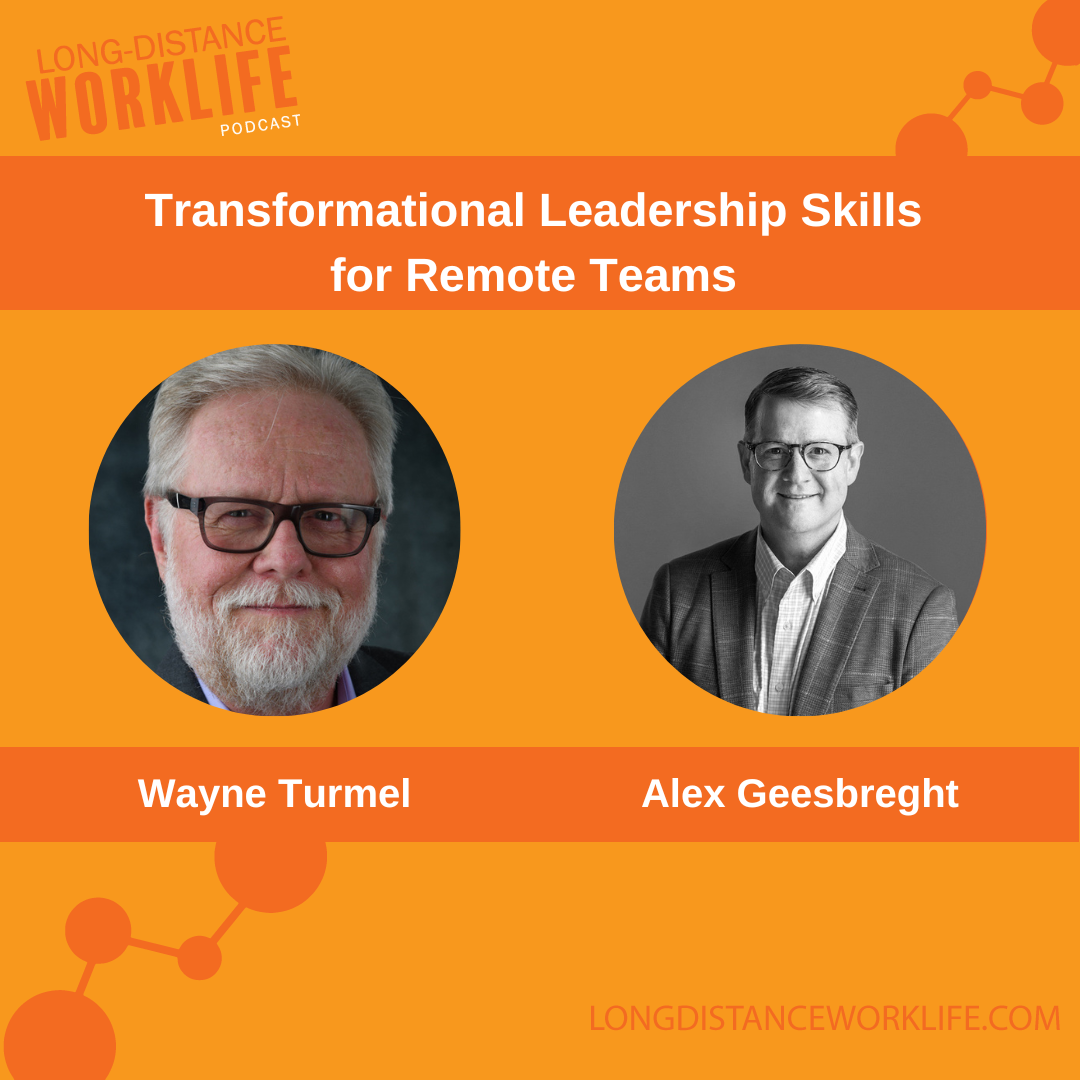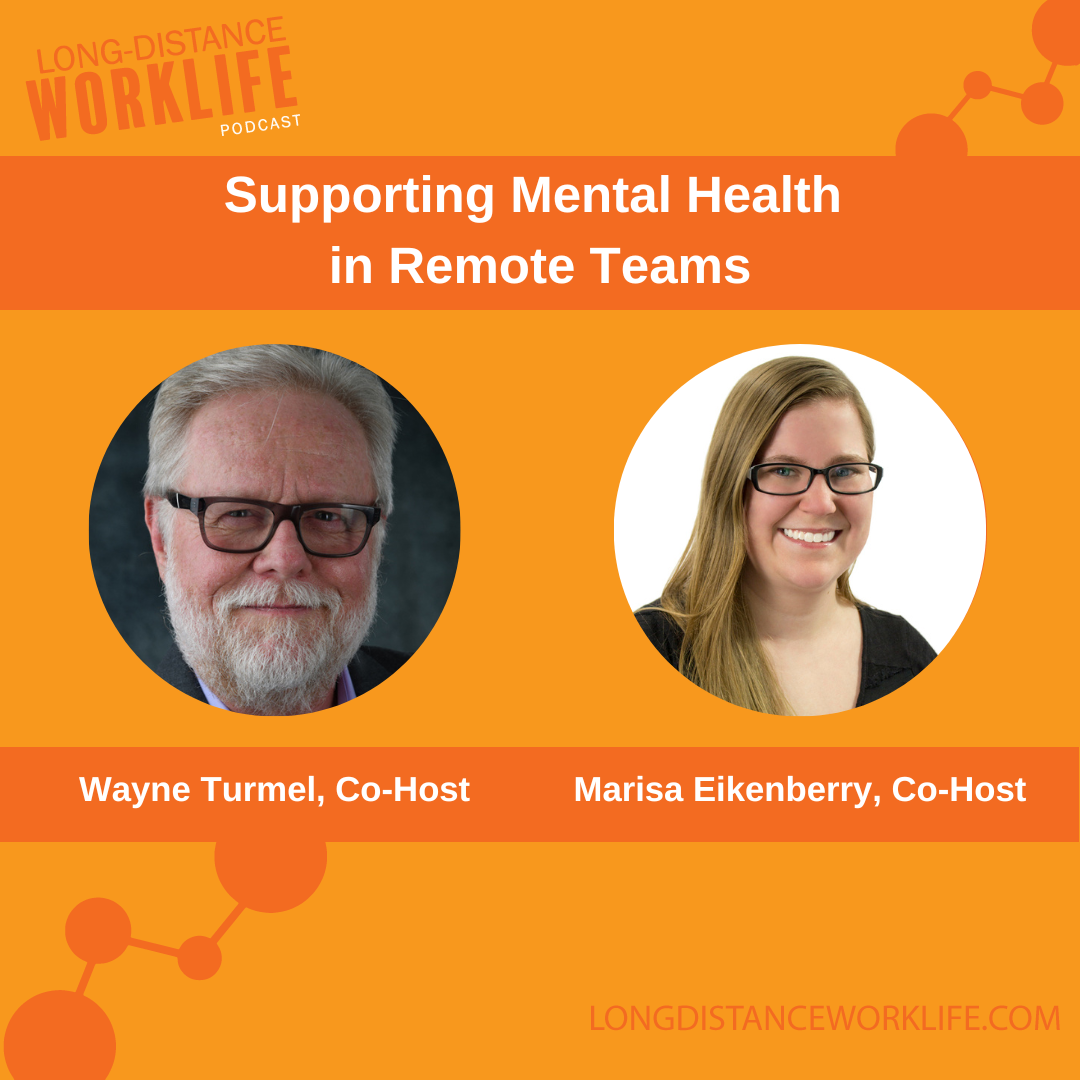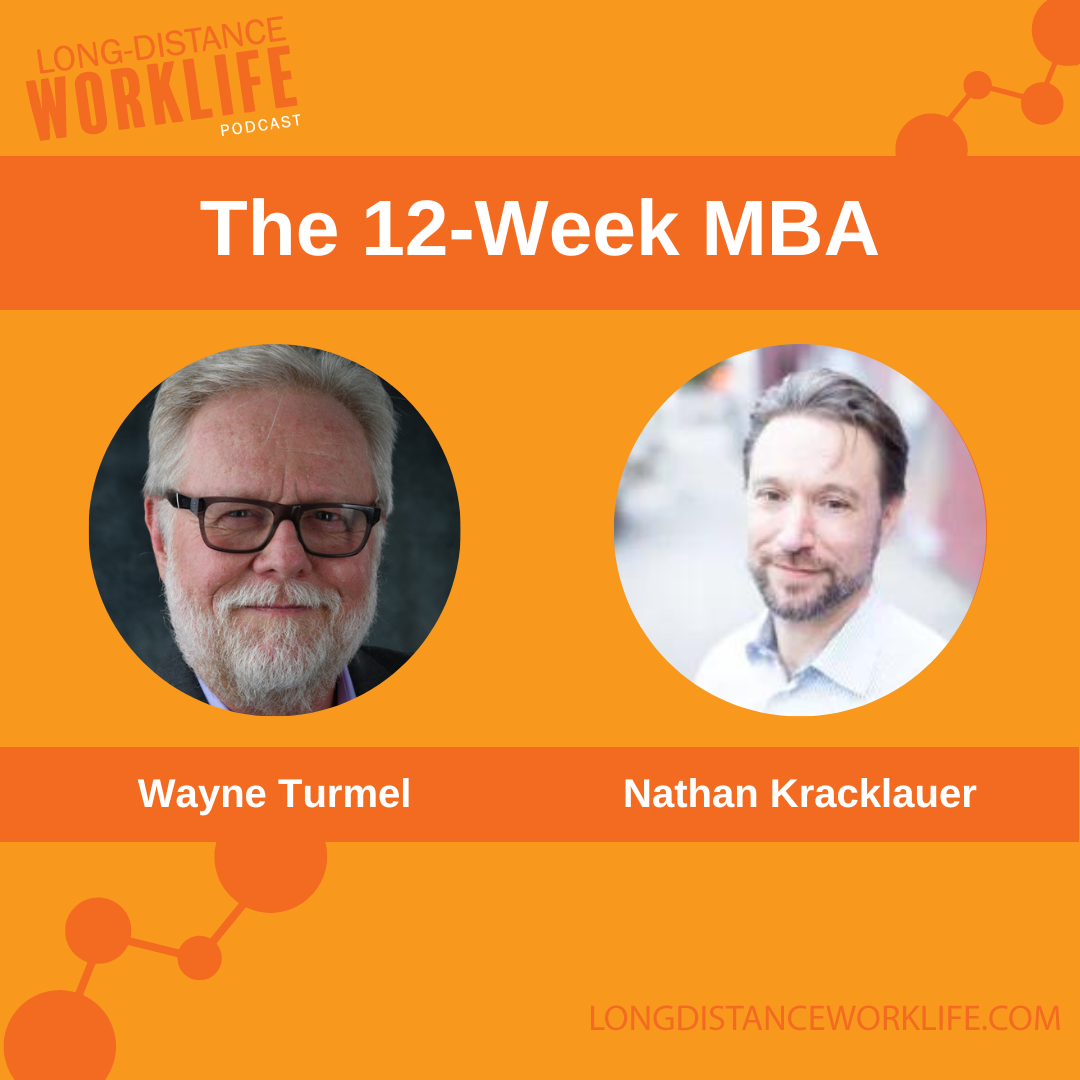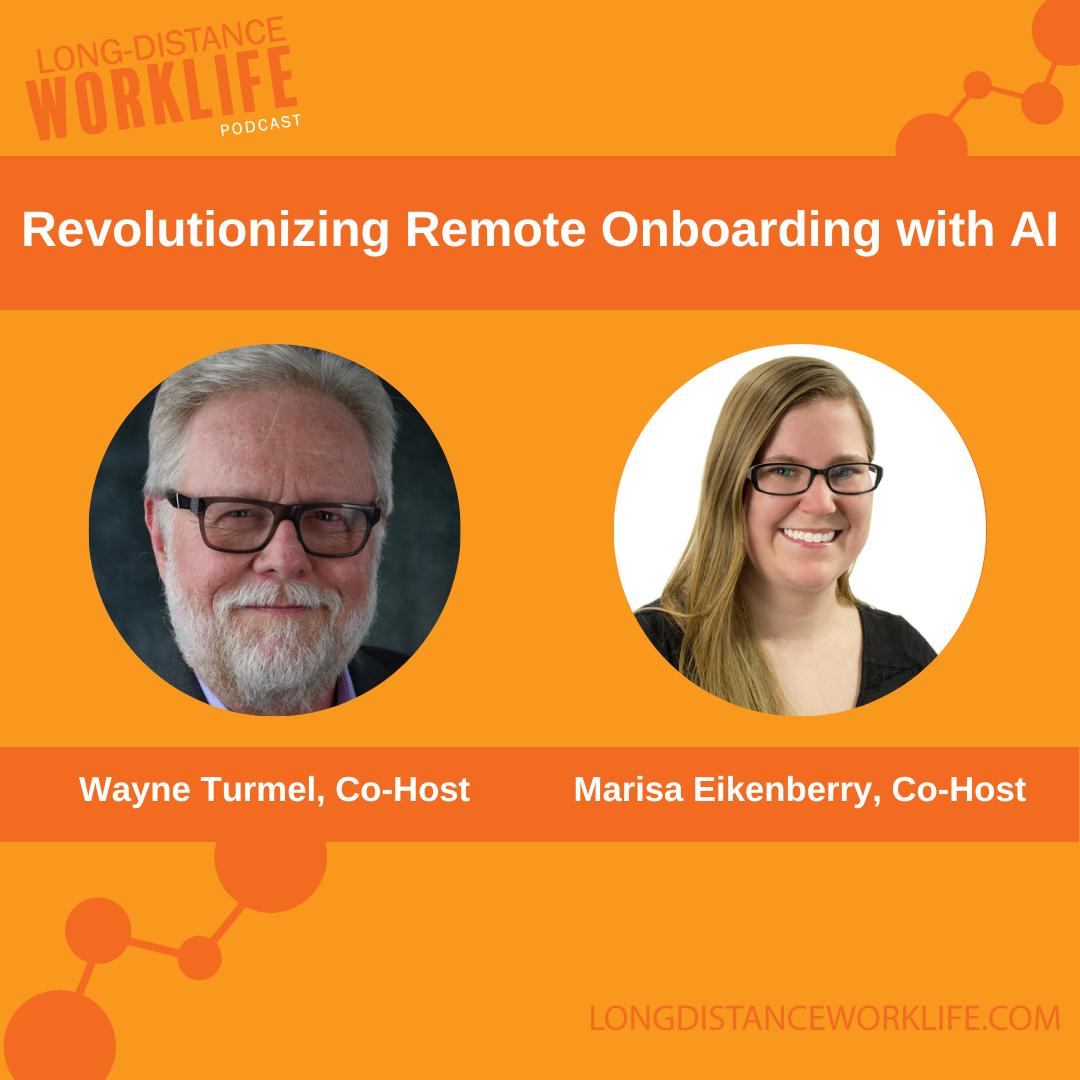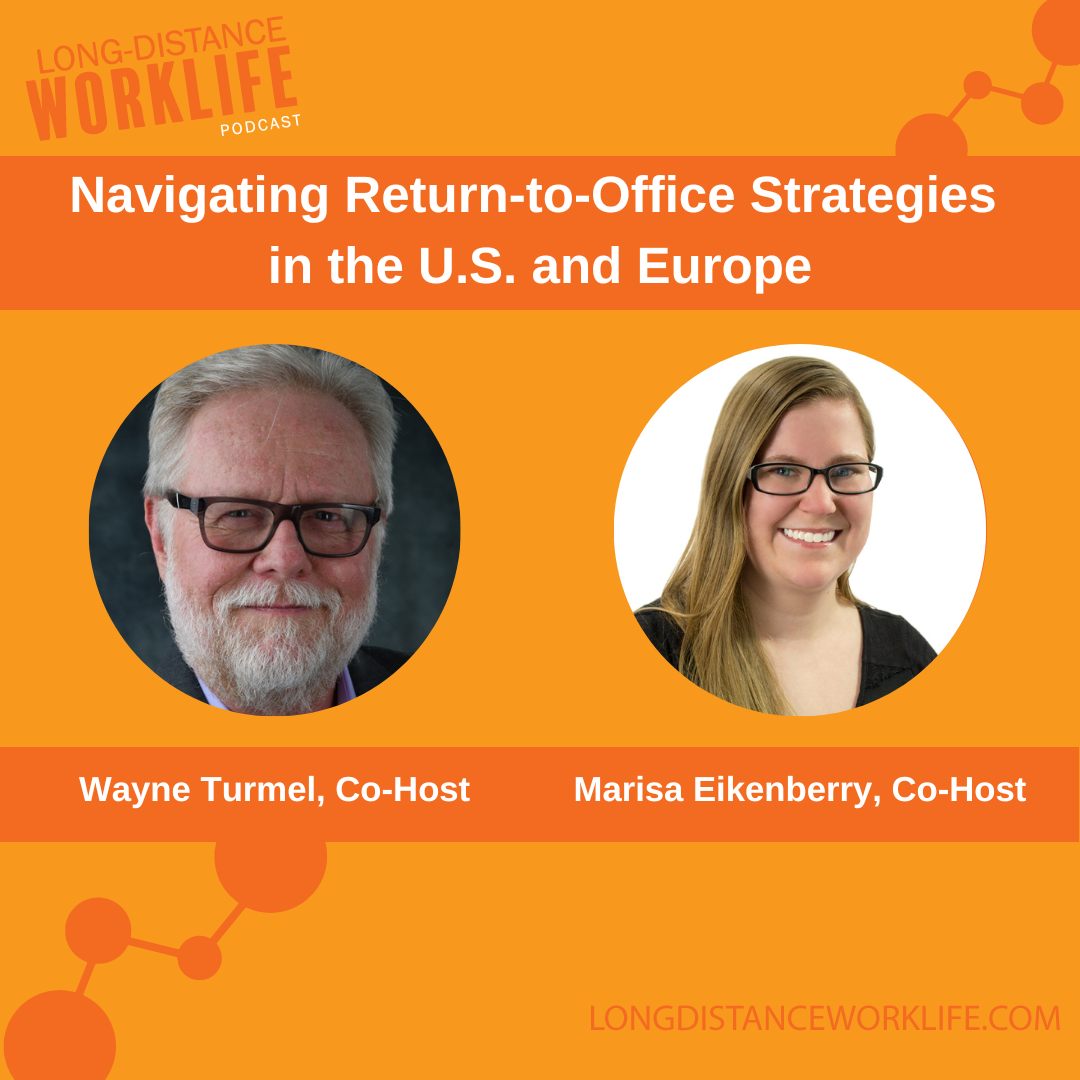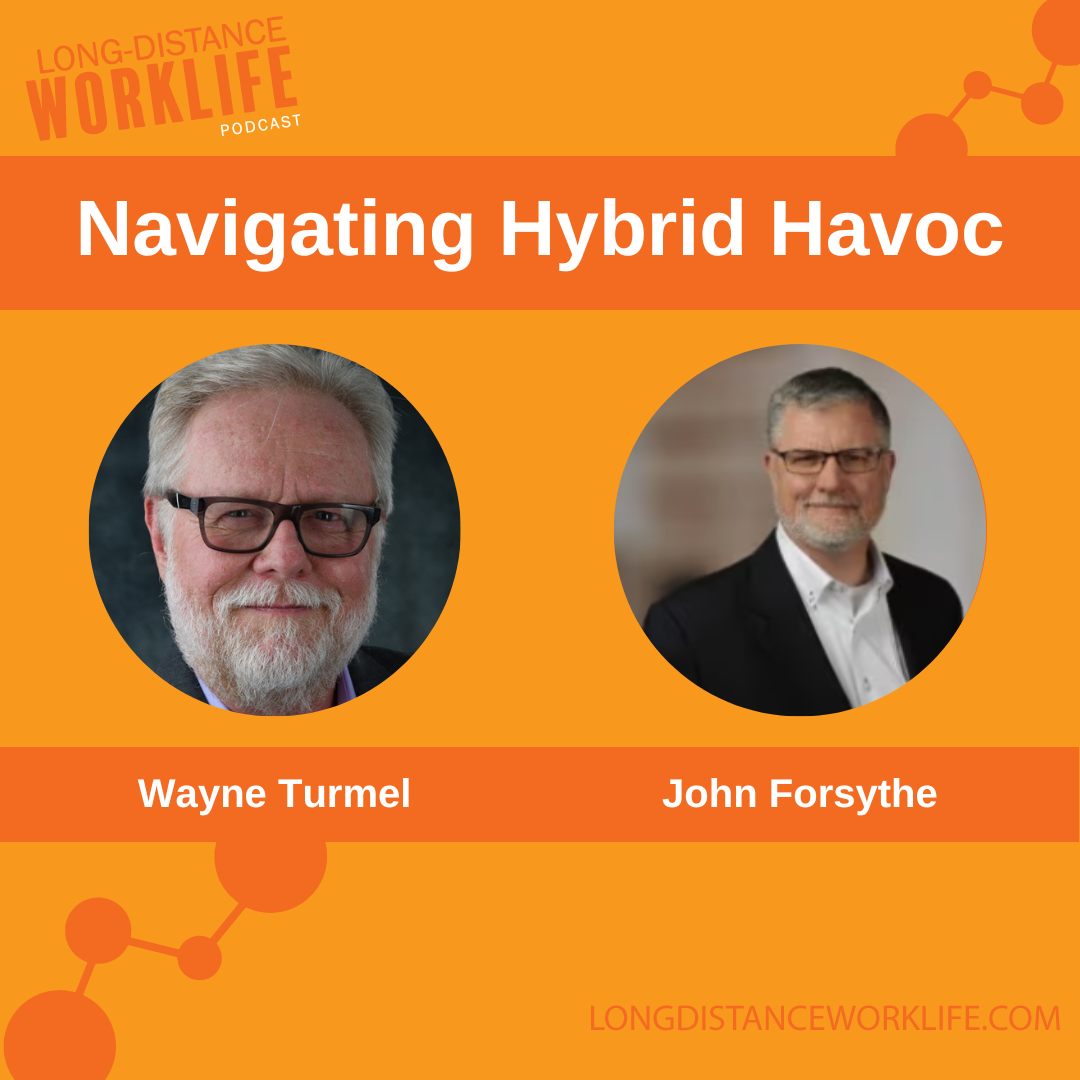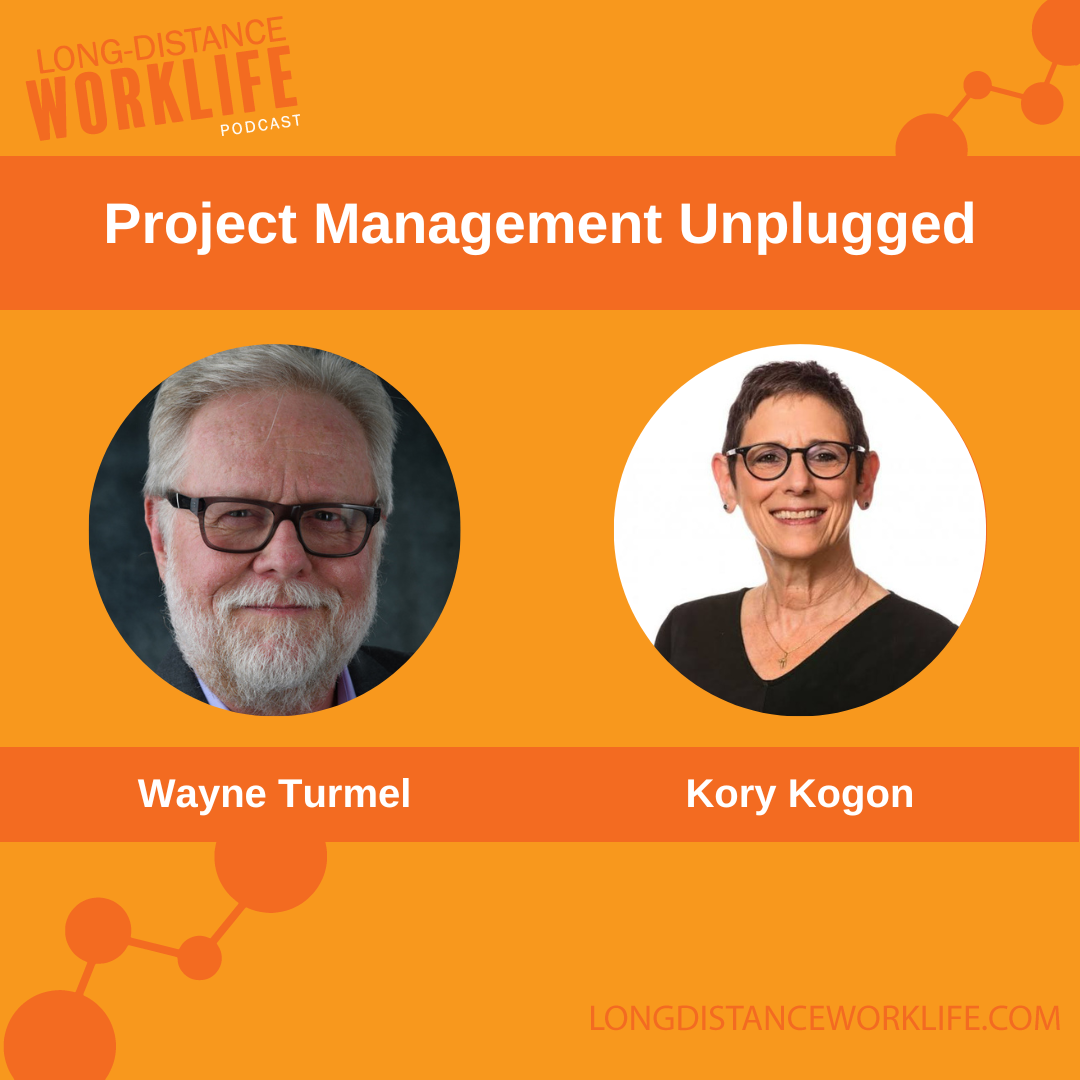This is a repost of one of our favorite episodes from The Long-Distance Worklife. As we approach the release of the 2nd edition of The Long-Distance Leader, we’re revisiting this special conversation where Wayne Turmel and Marisa Eikenberry celebrate the book's fourth anniversary. Wayne reflects on the unexpected changes in remote work since the original publication, how the book's advice has held up, and what to look forward to in the updated edition. Whether you’re new to the podcast or revisiting this discussion, it’s the perfect time to hear insights on leading from a distance.
Key Takeaways
1. The Unexpected Surge in Remote Work: How the pandemic accelerated trends and pushed remote work to the forefront.
2. Stealth Remote Work: The hidden practice that many companies ignored until 2020.
3. Evergreen Principles: Why the leadership principles in The Long-Distance Leader remain relevant, even as technology and work patterns evolve.
00:00:08:18 - 00:00:18:18
Wayne
Hello everybody. Welcome to The Long-Distance Worklife podcast. I am Wayne Turmel. Along with me is my co-host and copilot, Marisa Eikenberry.
00:00:18:22 - 00:00:19:15
Marisa
Hi, everybody.
00:00:20:09 - 00:00:41:23
Wayne
And this is the podcast. For those of you unfamiliar, where we're just trying to work our way through the world of long distance work, whether that's being a digital nomad, whether it's working from home full time or in the office some days or not, and bouncing back and forth. And it's a hybrid world. That's what we're doing today.
00:00:41:23 - 00:00:47:01
Wayne
And Marisa chose today's topic and I am going to let her tell you what it is.
00:00:47:23 - 00:01:03:14
Marisa
So at the time of recording this, we're celebrating the fourth anniversary of the book, The Long-Distance Leader, co-written by Kevin Eikenberry and my co-host Wayne Turmel. And we wanted to invite you into our celebration by hearing insights about the book straight from one of the authors. So, Wayne, if you're ready to dive in, I'm ready.
00:01:04:00 - 00:01:08:11
Wayne
Yeah, it's always a little weird talking about your work, but I am happy to do it.
00:01:09:11 - 00:01:19:09
Marisa
So one of the first things I wanted to start with is other than the obvious pandemic remote work surge, like what did you not expect to happen with remote work when you wrote the book?
00:01:20:05 - 00:01:21:23
Wayne
You can't yadda yadd a third of the workforce
00:01:23:19 - 00:01:24:02
Marisa
Fair.
00:01:24:03 - 00:01:47:03
Wayne
For getting sent home. You can't do. It's like other than the invention of the telephone, what's changed in communication. The Long-Distance Leader and this is now the first of soon to be three books in the Long-Distance Worklife series. Long-Distance Leader came out in 2018.
00:01:47:03 - 00:01:47:22
Marisa
Mm hmm.
00:01:47:22 - 00:02:02:04
Wayne
And at the time, as I have explained to people who said, boy, you guys were in the right place at the right time, I felt a little bit like the crazy guy with the sandwich board walking up and down the street saying the end is nigh, man.
00:02:02:13 - 00:02:21:13
Wayne
Now I just have a new sandwich board that says, "Told you." What has changed primarily and you can't discount this is that remote work was growing and it was growing at 30% a year, which is a lot.
00:02:21:13 - 00:02:43:16
Wayne
Crazy high exponential growth. But what happened in 2020, of course, is that we got pushed across the Rubicon and all these people who said, well, we should have a policy and we should think about it and maybe we should experiment with remote work. And this is not a drill. This is real.
00:02:44:00 - 00:02:44:10
Marisa
Right.
00:02:44:22 - 00:02:54:18
Wayne
And some organizations went, yeah, okay. Because there was a lot of people doing what I call stealth remote work.
00:02:55:04 - 00:02:56:10
Marisa
Okay. So what's that?
00:02:56:22 - 00:03:06:12
Wayne
Stealth remote work was, "Where's Marisa today? Oh, her kid's sick. She's working from home. She'll take the conference call from home."
00:03:07:03 - 00:03:07:12
Marisa
Okay.
00:03:07:23 - 00:03:15:13
Wayne
Or somebody was working. I'm working on a project. It's impossible to get anything done in the office. I'm going to go home and work.
00:03:15:22 - 00:03:16:06
Marisa
Right.
00:03:17:03 - 00:03:21:21
Wayne
And a lot of organizations just pretended like this wasn't happening.
00:03:23:09 - 00:03:24:00
Marisa
Hence the stealth.
00:03:24:00 - 00:03:41:17
Wayne
I have a client, a big international company. And I remember distinctly walking through her office and her saying, "Wayne, I love you guys, but, you know, we don't do remote work. Everybody needs to come into the office." And I'm walking through the office and 50% of the desks empty.
00:03:42:01 - 00:03:42:18
Marisa
Oh, my gosh.
00:03:42:19 - 00:04:01:11
Wayne
They're obviously assigned. There's pictures of kids and cats and. Yeah, inflated birthday balloons. And I'm like, oh, so-and-so's in Denver today. So-and-so's kid was sick. If they are working and they are not at their desk, they are remote.
00:04:01:11 - 00:04:01:23
Marisa
Right.
00:04:01:23 - 00:04:16:18
Wayne
The organization had zero process in place for things like performance reviews and, you know, everything. Career path, everything was based on presence in the office.
00:04:17:07 - 00:04:33:00
Wayne
Even though people weren't in the office and that was going on a lot. So what happened in 2020 is everybody got pushed out of the boat by a third of the workforce. And we have to remember it's only a third of the workforce.
00:04:33:04 - 00:04:33:15
Marisa
Of course.
00:04:34:05 - 00:05:04:04
Wayne
A third of the workforce suddenly found themselves in this situation. And the reactions, of course, ranged from what's the big deal? I've been doing this forever and I hear a lot of that. I hear a lot of people. And why is everybody so freaked out? Because I was doing this before the pandemic to oh, my gosh, we didn't think these jobs could ever be done remotely to I can't wait to get back in the office.
00:05:04:09 - 00:05:04:18
Marisa
Yeah.
00:05:05:15 - 00:05:17:07
Wayne
Right. So the big thing was this was building up, building up, building up. And then it happened. And fortunately for us, as, you know, mercenary weasel selling books.
00:05:17:07 - 00:05:18:09
Marisa
Mm hmm.
00:05:18:09 - 00:05:33:11
Wayne
We were there when that happened. And the response to Long-Distance Leader has been just overwhelmingly positive. And very encouraging. And of course, for our business, which is teaching.
00:05:33:11 - 00:05:33:22
Marisa
Of course.
00:05:33:22 - 00:05:37:13
Wayne
Stuff, that's not a bad thing either.
00:05:37:20 - 00:05:55:15
Marisa
Right. So so with that, I know that in the book you guys have best practices and you have models and. Has anything from the book changed since you've written it? Anything that was a best practice. But maybe now that more people are remote, it's a little different.
00:05:56:09 - 00:06:08:10
Wayne
I, I think what's happened with the book is the general principles are pretty solid. We wrote the book intentionally to be evergreen.
00:06:08:17 - 00:06:09:03
Marisa
Right.
00:06:09:07 - 00:06:19:16
Wayne
Right. But some things have happened. I mean, one of the things in the book is we're telling people, use your webcam, use your webcam, use your webcam, because there was a lot of resistance.
00:06:19:16 - 00:06:20:06
Marisa
Yes.
00:06:20:06 - 00:06:39:14
Wayne
And then Zoom came along. And it's fascinating from a watching technology thing. Right. Because Zoom went from this free niche product that nobody in corporate America was using to a verb, to a syndrome in 18 months.
00:06:39:22 - 00:06:40:11
Marisa
Right. Well.
00:06:41:01 - 00:06:47:02
Wayne
People are already now people are already ditching Zoom for their internal things like Teams.
00:06:47:13 - 00:06:47:22
Marisa
Right.
00:06:48:06 - 00:07:00:14
Wayne
Slightly different things. So use your camera. Use your camera. Use your camera. Now, people are on meetings from morning till night and they're suffering Zoom fatigue. And that's a very real thing.
00:07:00:21 - 00:07:01:11
Marisa
Of course.
00:07:01:18 - 00:07:14:22
Wayne
So the message is still use your camera a lot because it's a really good idea and use your head. Right. If you're one of 17 people on a meeting, nobody needs to watch you eat your sandwich.
00:07:15:06 - 00:07:17:23
Marisa
Right. But one on one, you'll definitely want to turn it on.
00:07:18:02 - 00:07:37:02
Wayne
The more the communication needs to be rich, the more it adds value. And it's just it's like everything else. Use your head when it adds value to it. And, you know, I just got back from the gym is a pretty lame excuse. If it's just you and a coworker. Right?
00:07:37:02 - 00:07:40:05
Marisa
Right. Yeah. But if it's a full team meeting, a little different.
00:07:40:17 - 00:07:53:06
Wayne
Exactly. So, you know, the the kind of it went it's shot way past use your webcam, to is it okay if we don't use our webcam sometimes?
00:07:53:14 - 00:07:54:02
Marisa
Right.
00:07:54:09 - 00:08:16:02
Wayne
So that was one thing that certainly happened. The other thing and again, it's a matter of degree and intentionality is we were we in the book talk a lot about how you need to be connected and rich communication. And what happened was people just automatically defaulted to the Web meeting.
00:08:17:01 - 00:08:17:20
Marisa
Okay. Yep.
00:08:19:02 - 00:08:32:08
Wayne
And it used to be in the glorious before times. One of the reasons you went home is so you got left alone to do your work. Right now, I'm point is that I'm in meetings back to back to back to back?
00:08:32:21 - 00:08:34:14
Marisa
Yeah. When am I supposed to get my work done?
00:08:34:21 - 00:08:43:14
Wayne
Yeah. And people are struggling with this. And so they as the pendulum always does, it's swinging to, well, we're going to have no me, no meetings Fridays.
00:08:43:21 - 00:08:46:15
Marisa
Right. Yeah. We've been seeing a lot of articles about that lately.
00:08:46:16 - 00:08:48:08
Wayne
That's fabulous for Friday.
00:08:49:12 - 00:08:51:01
Marisa
What about Monday through Thursday?
00:08:51:01 - 00:08:57:05
Wayne
And all the meetings that were going to happen on Friday and how you're shoehorning them into Monday through Thursday.
00:08:57:13 - 00:09:00:06
Marisa
So Friday suddenly gets very stressful.
00:09:01:01 - 00:09:31:23
Wayne
Exactly. So I think we are both blessed and intentionally so because the book was intended to be evergreen and I think it holds up pretty well. There are a couple of things that maybe we should reword, things like use your webcam and when you meet the like that. But I think overall it stands up pretty well and that's certainly the feedback that we're getting.
00:09:32:10 - 00:09:46:23
Marisa
Yeah, absolutely. One of the other things I wanted to talk about and so, you know, you called The Long-Distance Leader, The Long-Distance Teammate. We are The Long-Distance Worklife. Why 'long-distance' as opposed to some of the other terms we see in remote work?
00:09:48:21 - 00:09:58:19
Wayne
Because the language changes really quickly. And so rather than hook on to whatever we're using in the zeitgeist at this moment, when we didn't just invent our own darn word.
00:09:59:16 - 00:10:00:09
Marisa
That's fair.
00:10:01:12 - 00:10:04:14
Wayne
It's like it won't go out of style because it's ours, darn it.
00:10:06:15 - 00:10:28:02
Wayne
You know, if you look at, for example, in 2018, when The Long-Distance Leader came out, the government was investing a buttload of money and still are. And people can say what they want about government work. But there were a lot of people giving thought to this even before the pandemic. But it was called telework or tele, right?
00:10:29:02 - 00:10:47:14
Wayne
That was the word. And then suddenly nobody was using it. And then everybody was using remote. Well, you know, the whole idea of long distance is that it covers time, space and dimension. Right. It's not just physical separation. It's time zones. It's flexibility.
00:10:48:08 - 00:10:48:17
Marisa
Yes.
00:10:49:01 - 00:11:10:18
Wayne
Time flexing and and those types of things. So, I mean, it's it's a word we could brand around it. If you were being completely cynical and honest, you know, in the interest of full, transparent. See, to our viewers, these are the kind of decisions you make when you're writing a book. But it turned out to be a pretty good one.
00:11:11:12 - 00:11:11:19
Marisa
Yeah.
00:11:12:09 - 00:11:37:11
Wayne
As we move towards a more hybrid kind of thing, as we move towards a hybrid working arrangement, the point is that some of the people are going to be further away than others. And that might mean just far enough that you only come into the office a day or two a week. So the long commute doesn't really hurt as much to being on the other side of the planet.
00:11:37:20 - 00:11:46:13
Marisa
Yeah, we're seeing a lot of digital nomads. I know there was even a digital nomad conference meet up something recently. I know those are happening all over the place.
00:11:46:13 - 00:11:49:16
Wayne
Irony of that. The irony of that is lost on nobody.
00:11:49:16 - 00:11:53:07
Marisa
I realize. But yeah, I mean, they.
00:11:53:09 - 00:11:56:11
Wayne
Let's all get together to talk about how we can be anywhere and do this.
00:11:56:22 - 00:12:12:08
Marisa
Well. And I can't think of the country right now, but I know there was a news story that came out recently about a country that's giving digital nomad visas. And I'm sure as more countries kind of hop onto that, there's probably going to be even more of these digital nomad long distance.
00:12:13:00 - 00:12:27:14
Wayne
It's happening a lot depending on where you are in the world. Costa Rica, some of the smaller countries in Europe, like Luxembourg and Andorra are doing this. You know, it kind of makes some sense.
00:12:27:14 - 00:12:35:02
Marisa
Right. So what is one takeaway that you hope that everyone gets by reading this book?
00:12:37:03 - 00:13:00:06
Wayne
Okay. You have to be careful what you wish for. Okay. In this world, when you put a book out, it gets reviewed and people come back. And we were very intentional that one of the most important rules that you had to bear in mind and it was, you know, we have these 19 rules, which is really 18, because rule number 19 is, remember, rule number one.
00:13:00:16 - 00:13:01:00
Marisa
Right.
00:13:02:02 - 00:13:06:23
Wayne
And rule number one was think leadership first, location second.
00:13:07:08 - 00:13:07:18
Marisa
Yes.
00:13:09:00 - 00:13:45:22
Wayne
And the whole point of that is, yes, it's different. And yes, you need to be very much more mindful about how you communicate and when you communicate how technology plays a role in that. But at the end of the day, good leaders demonstrate good leadership behaviors, and that makes it easier to cross these these barriers. And one of actually really the only major criticism of the book was, well, this is just the leadership.
00:13:46:02 - 00:13:49:03
Wayne
We know all this stuff.
00:13:49:03 - 00:13:49:15
Marisa
Okay.
00:13:50:05 - 00:14:19:05
Wayne
And that's actually fair. I mean, Kevin and I had a fair amount of discussion about how much of this general leadership thought do we put into this book that is specifically about remote. And by the way, we have the same conversation about The Long-Distance Teammate and the new book, which is coming out in February. The Long-Distance Team is a lot of it is just team building, being part of a team one on one.
00:14:19:22 - 00:14:33:15
Wayne
But what's I think what's important is that it is easy to get hung up on the differences. It's easy to get hung up on what's changed and forget what's really important.
00:14:34:21 - 00:14:38:05
Marisa
Yeah, forget that some of those leadership principles don't change.
00:14:38:19 - 00:15:00:21
Wayne
Yeah. And, you know, that is really critical. I mean, there are three things and we don't talk about this in the books specifically, but there are three things that make a remote team work. Number one is there needs to be a mission. We need to follow the mission. Right. Number two is that there needs to be accountability.
00:15:01:04 - 00:15:01:11
Marisa
Right.
00:15:01:20 - 00:15:06:12
Wayne
And number three is you need to leverage the technology at your disposal.
00:15:07:08 - 00:15:08:00
Marisa
Absolutely.
00:15:08:06 - 00:15:16:11
Wayne
And those things need to happen. But it all starts with what's the vision? Well, that's all leadership stuff.
00:15:16:13 - 00:15:24:06
Marisa
Yeah. I was going to say a lot of what you're saying, I mean, even leverage the technology, like even that could be said about people who stay in the office. Right.
00:15:24:06 - 00:15:35:10
Wayne
But accountability is management stuff. There's leadership type stuff. There's management stuff because all managers are leaders, but not all leaders are managers.
00:15:35:12 - 00:15:35:23
Marisa
Right.
00:15:36:19 - 00:15:52:17
Wayne
Or at least should be. And then there's the technology piece. Right. And there are teams that run very low tech and are highly successful. There are teams with all of the tools in the world that can't find her, but with both hands.
00:15:53:04 - 00:15:53:11
Marisa
Right.
00:15:55:01 - 00:16:15:01
Wayne
That's the highly technical, professional way of explaining it. And so I think that the criticism that there's a lot of general leadership stuff in the book and, you know, I think a lot of people who read books like this or read a lot of books like this, of course.
00:16:16:07 - 00:16:19:10
Marisa
Yeah. You don't just read one and say, oh, I know everything about this topic. Now.
00:16:19:17 - 00:16:23:21
Wayne
And generally, leadership nerds tend to read leadership books.
00:16:24:04 - 00:16:24:13
Marisa
Right.
00:16:25:04 - 00:16:32:15
Wayne
And so, yes, you have heard a lot of this before. Now, if you look around the world and say, are people doing it?
00:16:33:17 - 00:16:34:07
Marisa
Yeah. So my.
00:16:34:07 - 00:16:36:02
Wayne
Dialog. Different conversation.
00:16:37:06 - 00:16:37:16
Marisa
Yes.
00:16:38:19 - 00:17:09:01
Wayne
But yeah. So I think that is the and that's the thing about the book is that it's going to help stay evergreen because those leadership behaviors don't change. And yes, you know, the book was written presold. I mean, Zoom literally isn't in the book. Right. When we wrote Long-Distance Teammate, the first draft was in before the pandemic.
00:17:09:11 - 00:17:13:20
Wayne
But the second draft the world had already shut down.
00:17:14:05 - 00:17:17:07
Marisa
Oh, wow. I'm not sure I realized that.
00:17:17:07 - 00:17:22:10
Wayne
Well, the first draft was finished first in January of 2020.
00:17:22:15 - 00:17:23:08
Marisa
Yeah.
00:17:23:08 - 00:17:30:12
Wayne
And then we send it out and we get the notes and we come back and we have to do the second draft that happened in March.
00:17:31:04 - 00:17:32:14
Marisa
Oh, my gosh.
00:17:32:23 - 00:17:52:18
Wayne
Well, in between it's like, okay, do we talk about the pandemic? Do we reference it? Zoom is suddenly a thing. There was no mention of Zoom. We intentionally tried to avoid brand names and specific technologies. We talk about meeting platforms. Right. To this tool or that tool.
00:17:53:00 - 00:17:53:09
Marisa
Right.
00:17:54:23 - 00:18:09:03
Wayne
And so because we made those decisions, generally speaking, it holds up pretty well, as evidenced by the fact that the last two years the book has sold almost identical number of copies year over year.
00:18:09:03 - 00:18:11:15
Marisa
Yeah. People still need that stuff.
00:18:11:15 - 00:18:29:07
Wayne
Which in any book is a rare and beautiful thing. So we are extremely grateful. Absolutely. And now, of course, there's Long-Distance Teammate which is from the teammates point of view, because one of the big questions is how do we form relationships and how do we.
00:18:29:22 - 00:18:32:08
Marisa
Yeah, I'm not a leader, but how do I do things?
00:18:32:14 - 00:18:55:12
Wayne
So that's what Long-Distance Teammate is. And now that we are coming out of the pandemic to some degree and everybody's going, what's next? We literally on Friday submitted the final manuscript for the Long-Distance Team, which is about taking a step back and saying, if we were building this team from scratch, what would it look like?
00:18:55:20 - 00:19:00:05
Marisa
Right. And reminds me, I know it's coming out next year, but when as a.
00:19:00:05 - 00:19:02:18
Wayne
Contract, February 28th, give or take.
00:19:03:01 - 00:19:26:07
Marisa
Perfect. So put that on your calendar, folks. Wayne, I wanted to thank you so much for this conversation. I mean, I know that Long-Distance Leader has changed a bunch of lives, a bunch of companies as people read it and and do the practices in it. I also wanted to thank you, audience members, for listening to the Long-Distance Worklife. For show notes, transcripts and other resources.
00:19:26:07 - 00:19:42:06
Marisa
Make sure to visit longdistanceworklife.com if you haven't yet. Subscribe to the podcast so you won't miss any future episodes while you're there. Be sure to like and review that helps our show reach more teammates and leaders just like you. Feel free to contact us via email or LinkedIn with the links in our show notes.
00:19:42:11 - 00:20:13:15
Marisa
Let us know you listen to this episode or even suggest a topic for Wayne and I to attack on a future episode. Lastly, if you're interested in purchasing The Long-Distance Leader, you can check out our website at longdistanceworklife.com/books for more information and links to purchase. Thanks for joining us. And as Wayne likes to say, don't let the weasels get you down.
Timestamps
00:00 Introduction and Welcome
00:47 Celebrating The Long-Distance Leader's Anniversary
01:09 The Unexpected Evolution of Remote Work
02:21 Stealth Remote Work: Before It Was Mainstream
05:05 The Impact of the Pandemic on Remote Work
06:56 Best Practices: What’s Changed and What Hasn’t
09:32 The Evergreen Nature of Leadership Principles
12:12 The Choice of the Term "Long-Distance"
16:38 Key Takeaway: Leadership First, Location Second
Related Episodes
Additional Resources
Pre-Order The Long-Distance Leader
Perfect your remote leadership skills with the updated edition of "The Long-Distance Leader" by Kevin Eikenberry and Wayne Turmel, featuring new principles and proven strategies for today's hybrid work environments.
